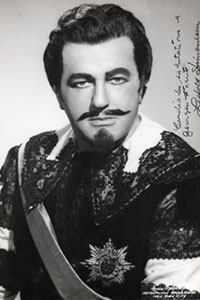The History of The Tenor Narrated
The History of Léopold Simoneau

Born: May 3, 1916
Died: August 24, 2006
Canadian tenor.
Narrative 1
It is good to be able to introduce a French Canadian into our survey.
Our first Canadian since Edward Johnson. Leopold Simoneau was born in Quebec on the 3rd of May 1918.
He studied in Montreal with a teacher named Salvador Isarell and made his debut there in 1941, in Deluge’s opera Lakme.
After successful appearances, in Cosset fan Toote in the Magic Flute, he studied further in New York with Paul Malthouse, who you may remember, was all for the teacher of Richard Tucker.
He sang in the United States before making his opera comique debut in 1949 in Gunos opera Marais and remained in Paris for five seasons.
His reputation as a Mozart specialist was first established at the Aeon Provence and Glenburn Festivals.
He sang at La Scala in 1953 and in London with the Vienna State Opera in 1954, becoming part of the now legendary team that comprised Anton Dermota among others.
Further important appearances were at the Cologne in Buenos Aires, at the Salzburg Festival and from 1963 at the Metropolitan Opera, New York. Simoneau is a member of the Order of Canada and has honorary doctorates from the universities of Ottawa, St Catherine’s and LaValle in Quebec.
He taught at the Montreal Conservatory and was later appointed to the Quebec ministry for cultural affairs.
He played a leading part in forming the first statutory subsidised opera company in North America, the opera de Quebec in 1971, of which he became Artistic Director.
He resigned shortly after it opened and moved to San Francisco in 1972.
The following extracts, with illustrations, had taken from a review of his recordings in John Steane’s book, The Grand Tradition.
The most elegant of Mozart tenors, since the Second World War was the French-Canadian Leopold Simoneau.
Whose recording career has been a short one, he has nevertheless made records which still set the best standard in our time.
We think of him nowadays, almost exclusively in Mozart, but several other parts of the lyric tenor repertoire, have been graced by his performances in them.
In the Pearl Fishers, we become immediately aware of a tenor singing in the tradition of Edmond Clement’, that is, his tone is absolutely clear and precise in focus, and he draws a fastidiously clean, even line.
One anomaly forces itself upon the attention, even here. It is surprising that so careful and tasteful a singer, should have allowed the habit of lifting upwards, towards a high note to become so noticeable a feature of his style. Sometimes, he will take the note with the precision, one would expect of him. Who in Femme Apari’s for example, in the duet.
But sooner or later he will resort again to an upward portamento as we find later in the same duet.
But this is still fine singing, remarkable in modern times, for its poise.
Narrative 2
Simoneau’s for instance, is surely the most elegant, well-mannered, performance of Di Me Bollenti Spirate from La Traviata. And hearing him, one remembers that Alfredo was a Frenchman.
Narrative 3
In the Pearl Fishers, Traviata and an aria from Manon & Mignon we can hear a tenor who like Clement and Muratore in the earlier generations, kept the voive trim and slender. Their style gracefull without becoming insipid.
Narrative 4
In Mozart, his qualities were priceless.
The clarity and sweetness of tone, unmudded by any throatiness, fitted the temperate brightness of a Mozart in score.
And an excellent technique could take this severe demand put upon it, without sign of strain.
In Addio Mignon, we hear something like the ideal combination of virility and refinement.
Warm and sympathetic in feeling, shading the music most sensitively, and never smudging the definition of tone.
Narrative 5
His wife, the soprano Pierret Alari, would often join him in his records.
And here too, there was much delicious singing, with delicate tone and a sword of fluency in runs that connoisseur would rave over, if he had been recorded about forty years ago earlier in 78.

